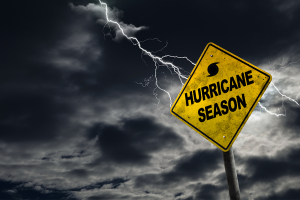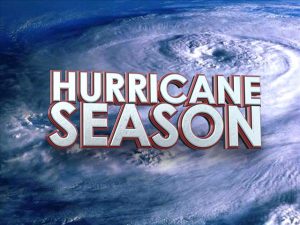 Courtesy of iii.org
Courtesy of iii.org
After Hurricane Andrew in 1992, insurers realized that losses from hurricanes could be much higher than they had previously thought. Hurricane Katrina, in 2005, which cost insurers more than $41 billion at the time, confirmed their fears. After these extraordinary losses, reinsurance companies, insurers that share the cost of claims with primary companies, such as homeowners insurers, said that they could not assume so much risk and that primary companies must reduce their potential losses.
During the Atlantic hurricane season, which lasts from June to November, every coastal state from Florida to Maine could potentially be hit by a storm. Increasing development along the coastal areas of these states has put more and more homes at risk of severe windstorm damage. To limit their exposure to catastrophic losses from natural disasters, insurers in these states sell homeowners insurance policies with percentage deductibles for storm damage instead of the traditional dollar deductibles, which are used for other types of losses such as fire damage and theft. With a policy that has a $500 standard deductible, for example, the policyholder must pay the first $500 of the claim out of pocket. But percentage deductibles are based on the home’s insured value. So if a house is insured for $300,000 and has a 5 percent deductible, the first $15,000 of a claim must be paid out of the policyholder’s pocket. The details of hurricane deductibles are spelled out on the declarations page of homeowners policies.
To some degree, depending on the state, insurance companies determine the level of the hurricane or windstorm or wind/hail deductible and where it should apply, except in Florida where state law dictates these variables. Insurers’ hurricane deductible plans must be reviewed by the individual state insurance department where they may be subject to various regulations and laws.
Nineteen states and the District of Columbia have hurricane deductibles: Alabama, Connecticut, Delaware, Florida, Georgia, Hawaii, Louisiana, Maine, Maryland, Massachusetts, Mississippi, New Jersey, New York, North Carolina, Pennsylvania, Rhode Island, South Carolina, Texas, Virginia and Washington DC. Listed below are reports for these states detailing hurricane deductibles.
Explanation of Terms:
- Beach Plan, FAIR (Fair Access to Insurance Requirements) Plan; and other involuntary or residual markets: insurers of last resort, state-run pools that provide insurance to people who are unable to obtain insurance in the voluntary market. Beach Plans operate in specific coastal territories, defined by zip codes, counties or geography; FAIR Plans are generally statewide.
- Deductible: amount of loss paid by the policyholder before insurance kicks in.
- Dollar deductibles: a flat dollar amount.
- Mandatory deductibles: may be set by insurance rules, regulations or state law, or by an insurer.
- Market Assistance Plan (MAP): a voluntary clearinghouse and referral system designed to put people looking for insurance in touch with insurance companies that have agreed to take on more business.
- Optional deductibles: mostly used in less vulnerable areas. Policyholders may opt for these higher deductibles in order to pay a lower premium.
- Percentage deductibles: calculated as a specified percentage, for example 2 percent, of the insured value of the property.
- Standard deductibles: an indication of the usual homeowners insurance deductibles in the state or area.
- Trigger: an event that is needed for a hurricane deductible to be applied. Hurricane deductibles are “triggered” only when there is a hurricane, or a tropical storm. Triggers vary by state and insurer and may apply when the National Weather Service (NWS) “names” a tropical storm, declares a hurricane watch or warning or defines the hurricane’s intensity. Triggers generally include a timing factor, i.e., damage occurring within 24 hours before the storm is named or a hurricane makes landfall up to as long as 72 hours after the hurricane is downgraded to a lesser storm or a hurricane watch cancelled.
How Hurricane Deductibles Work
There are two kinds of wind damage deductibles: hurricane deductibles, which apply to damage solely from hurricanes, and windstorm or wind/hail deductibles, which apply to any kind of wind damage. Percentage deductibles typically vary from 1 percent of a home’s insured value to 5 percent. In some coastal areas with high wind risk, hurricane deductibles may be higher. The amount that the homeowner will pay depends on the home’s insured value and the “trigger” selected by the insurance company, which determines under what circumstances the deductible applies. In some states, policyholders may have the option of paying a higher premium in return for a traditional dollar deductible, depending on how close to the shore they live. In some high-risk coastal areas, insurers may not give policyholders this option, making the percentage deductible mandatory. (See Infographic: Hurricane Deductibles.)
Florida Hurricane Deductibles
By Florida statute, the application of hurricane deductibles is triggered by windstorm losses resulting only from a hurricane declared by National Weather Service. Hurricane deductibles apply for damage that occurs from the time a hurricane watch or warning is issued for any part of Florida, up to 72 hours after such a watch or warning ends and anytime hurricane conditions exist throughout the state.
Hurricane deductibles and their triggers are set by law and are the same for the private, or regular market, as well as Floridas Citizens Property Insurance Corporation (CPIC), the state-run program which provides property insurance to consumers. The hurricane deductible applies only once during a hurricane season. All insurers must offer a hurricane deductible of $500, 2 percent, 5 percent and 10 percent of the policy dwelling or structure limits. The percentages are based on the total value of the home. By Florida law, property insurance rate filings must include mitigation discounts or credits. These are applied to property insurance premiums. These discounts are available for personal and commercial residential property only. See Florida Office of Insurance Regulation for details.
The CPIC (Citizens), Florida’s state-run insurer of last resort will insure new homeowners in high-risk areas and others who cannot find coverage in the open private market. Under Florida law, Citizens may write a new insurance policy only if no comparable private market coverage is available or comparable private market policy premiums are more than 15 percent higher than a comparable Citizens policy See website for details.
The Florida Market Assistance Program is a free referral service designed to match consumers who cannot find property insurance with Florida-licensed agents and insurers who are writing new business. See website for details.
Information Sources:
- The Florida Insurance Council
- Florida Office of Insurance Regulation
- Citizens Property Insurance Corporation
- Florida Market Assistance Plan



